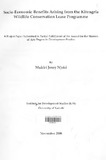| dc.description.abstract | This study sought to assess the socio-economic benefits arising from the Kitengela Wildlife Conservation Lease (WCL) Programme in Kitengela location of Kajiado district in Kenya. The study also sought to assess the programme's sustainability and effectiveness in promoting community benefits from wildlife conservation. Kitengela is situated south of the Nairobi National Park (NNP) and embodies an important wildlife dispersal area for the Nairobi National Park. The Kitengela WCL Programme aims to protect and ensure sustainable management of this ecosystem by countering the accelerating trend of land conversion through a combination of interventions that have provided direct benefits to the local community inhabitants, who as owners of land, have increasingly made land use choices that have been negative for wildlife conservation.
In order to address the study topic, both probability and non-probability sampling techniques were used to select sixty participating landowners who were interviewed. The study relied on both primary and secondary data. Primary data was gathered through a questionnaire survey, using both closed and open ended questions, key informant interviews and focused group discussions. Participant observation was also used
The study findings indicate that programme is beneficial in promoting education, reducing reliance on livestock, increasing household revenue among other benefits. The study established most landowners used the money from the programme to take their children to school. The study also established that the programme has promoted wildlife conservation because the programme has discouraged land sub-division and conversion. However, the programme is strongly dependant on donor contribution for sustenance and its sustainability is vulnerable. The study also established that the programme is not financially sustainable and thus recommends better wildlife management mechanism with strong implications towards benefit to the communities
that co-exist with wildlife. This study concludes that future conservation initiatives should focus on multi-faceted approach with a people-centered and participatory approach, responsive to changing circumstances, and capable of working at multiple levels. | en |

